The SAMSUNG S90D, also known as the S94D, is a device that has repeatedly pleasantly surprised us during our tests. It is worth mentioning that depending on the chosen size, the differences may concern the OLED panel used. However, regardless of which variant we encounter, one can count on excellent black levels and HDR effects, which, thanks to high brightness, make a huge impression. This is one of those TVs that really can elevate home viewing to a cinematic level. While testing films and series, we immediately noticed the great colour reproduction and depth of black. Dark scenes, which can be problematic on other screens, are full of detail and immersive here. Although the factory colour settings could be a bit better, after calibration the picture gained clarity, and the television showed what it is truly capable of. In terms of everyday use, we noticed that the wide viewing angles allow comfortable viewing even from less central positions. The Tizen operating system appealed to us – it is clear, fast, and offers access to the most popular applications. AirPlay works flawlessly, which was a nice addition during our tests. And what about picture fluidity?... The 144 Hz panel performs excellently. While watching sports, the image was smooth, with no hint of motion blur. Matches and races felt as if we were really in the stands. We also couldn't overlook the gaming tests. Low input lag and HDMI 2.1 support make the S90D/S94D an excellent choice for gamers. Games ran smoothly, and every movement was displayed with incredible precision. This is equipment that meets the expectations of even the more demanding console users. The SAMSUNG S90D/S94D is a television that combines excellent picture quality with modern features and versatility. Whether we are watching films, playing on a console, or simply using applications, this model impresses. In its price range, it is truly a strong contender.
- Matching (Score)
- Our verdict
- TV appearance
- Where to buy
- Contrast and black detail
- HDR effect quality
- Factory color reproduction
- Color reproduction after calibration
- Smoothness of tonal transitions
- Image scaling and smoothness of tonal transitions
- Blur and motion smoothness
- Console compatibility and gaming features
- Input lag
- Compatibility with PC
- Viewing angles
- TV efficiency during daytime
- Details about the matrix
- TV features
- Apps
- Playing files from USB
- Sound
Samsung OLED S90D / S94D (WRGB OLED) vs TCL C6K
Direct compare
S90DAE / S94DAE
C6K / C69K / Q6C

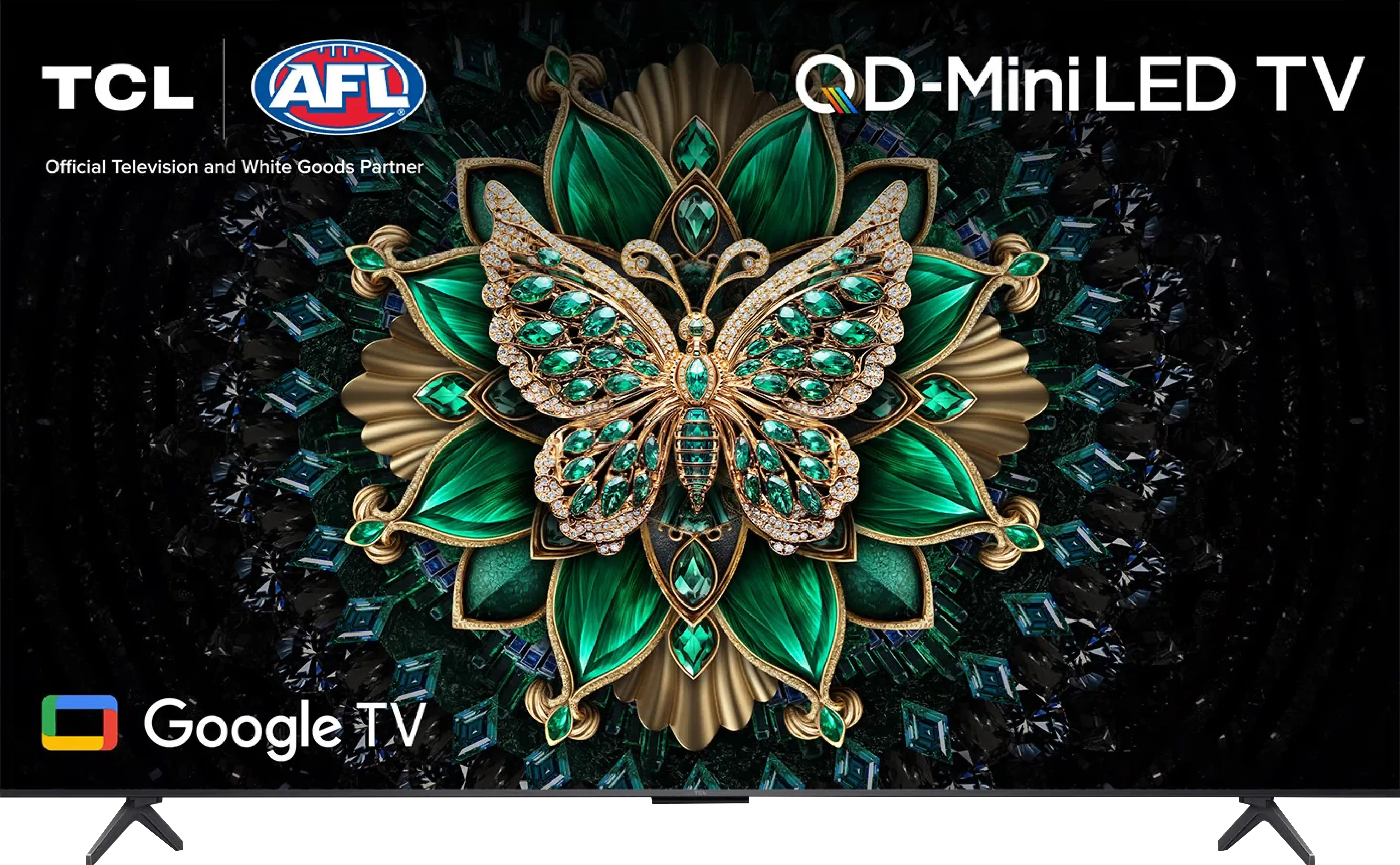
Panel type: WRGB OLED
Resolution: 3840x2160
System: Tizen
Model year: 2024
Complete the survey to find out the result

Panel type: LCD VA
Resolution: 3840x2160
System: Google TV
Model year: 2025
Complete the survey to find out the result

Overall rating
8.1
7.1
Movies and series in UHD quality
8.2
6.7
Classic TV, YouTube
8.7
6.6
Sports broadcasts (TV and apps)
8.5
6.3
Gaming on console
9.5
8.4
TV as a computer monitor
8.6
8.6
Watching in bright light
6.0
6.4
Utility functions
7.4
7.0
Apps
8.7
9.6
Sound quality
7.4
6.5
Complete the survey to find out what fits your preferences
Advantages
Ideal contrast
Great for 4K content
Excellent for gamers - 144hz, HDMI 2.1, low input lag.
Decent brightness
Advanced and smooth Tizen system
Very good contrast and black: VA panel and MINI-LED backlighting
Good motion smoothness: High refresh rate of 144Hz
Not bad brightness of the panel
Many features for gamers: VRR, ALLM, HDMI 2.1, HGiG
Additional mode for PC gamers: 240Hz
Google TV system with a wide selection of applications
Support for multiple HDR formats including Dolby Vision
Support for Dolby Atmos and DTS
Very attractive price
Disadvantages
The colours from the box need improvement
Missing Dolby Vision (not essential at this brightness but would be appreciated)
Managing the backlighting could be better
Language errors in the system
Our verdict
The TCL C6K is a television for those who want to combine gaming and watching films with good contrast, while not spending a fortune. Thanks to the VA panel with Mini-LED backlighting, blacks are deep, and the contrast is high, making evening screenings truly impressive. Additionally, there is decent brightness, which combined with Dolby Vision allows films to take on a cinematic quality. The smoothness of the picture is also noteworthy – the 144Hz refresh rate works wonders for sports or dynamic games, and gamers receive a full package of extras: VRR, ALLM, HDMI 2.1, HGiG, and even a 240Hz mode on PC. On a daily basis, the television runs on Google TV, which offers a plethora of applications and the Gemini AI voice assistant, making it convenient and flexible to use. It’s also worth mentioning the sound – support for Dolby Atmos and DTS gives the impression that the device is ready not only for gaming. As is often the case, there are a few things that could be improved. The backlighting can lose details or illuminate blacks in challenging scenes, and Polish translations in the menu are sometimes so awkward that one has to ponder what they actually mean. Despite this, the overall performance stands out very well, and considering the price, the TCL C6K could be one of the more interesting choices for anyone looking for a versatile television for films, sports, and gaming. Especially when a good promotion comes along – and when TCL traditionally polishes the small details in updates.
TV appearance





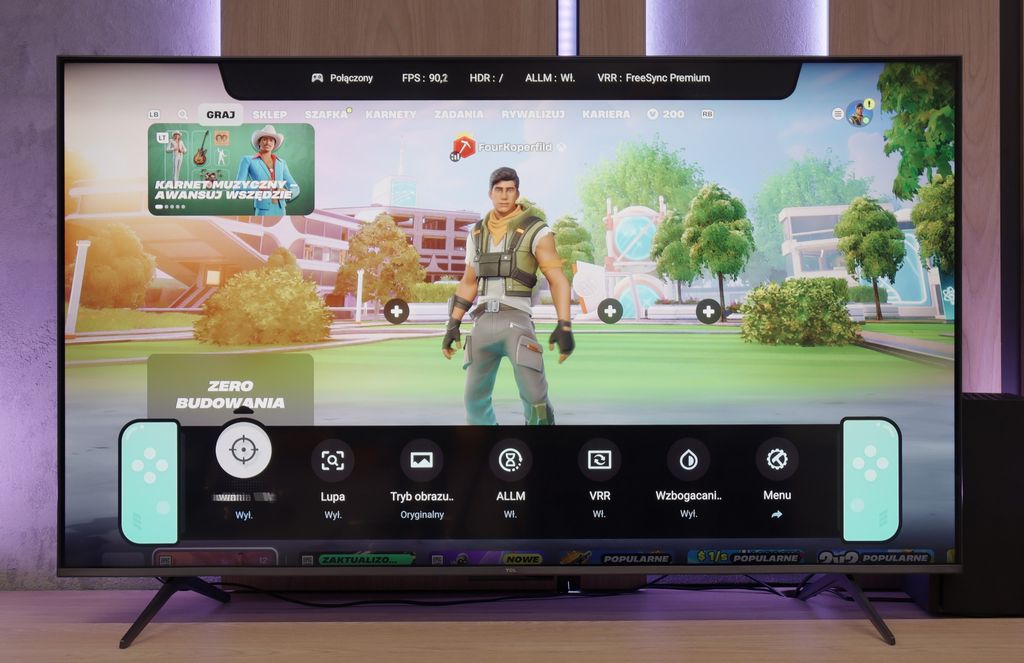
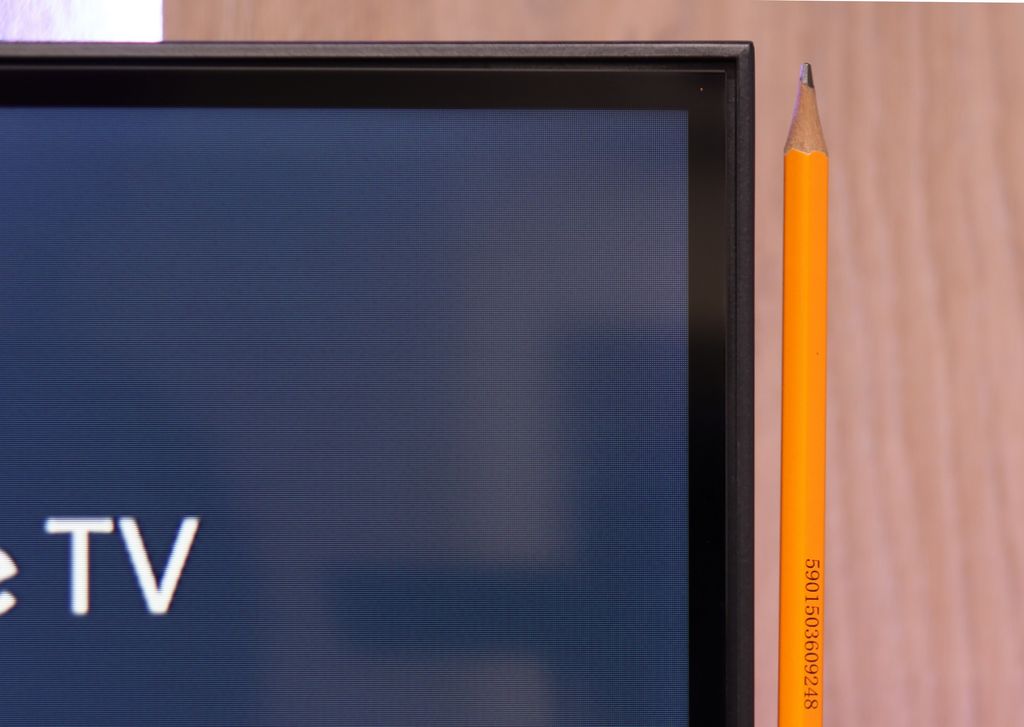
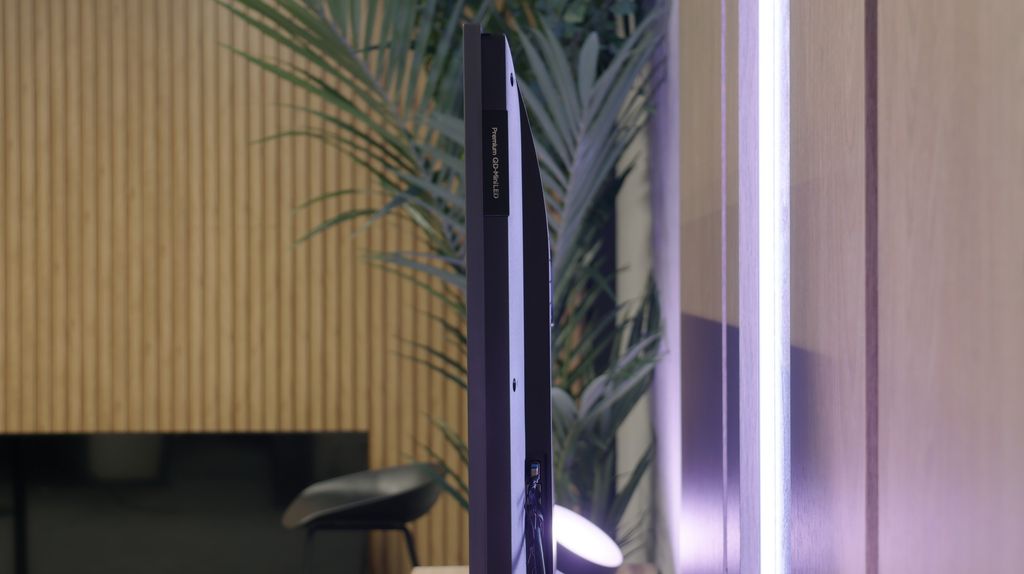
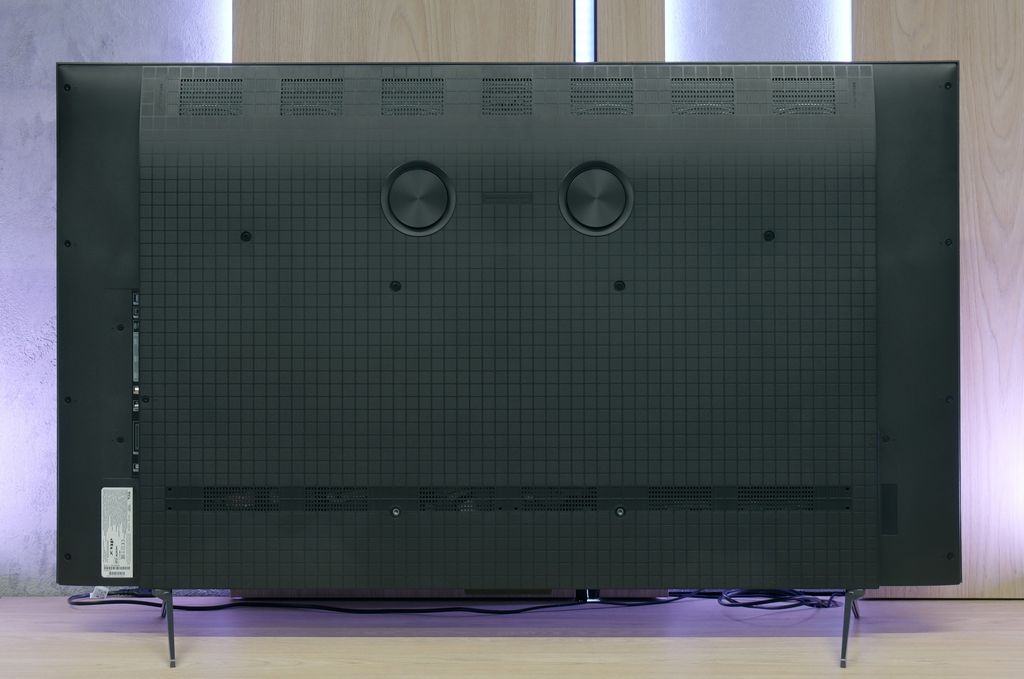
Contrast and black detail
10/10
7.3/10
Local dimming function: Yes, number of zones: 180 (10 x 18)
Contrast:
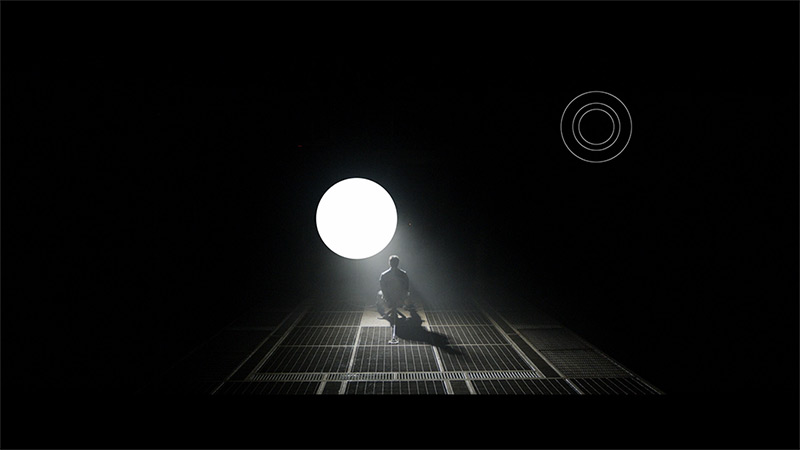
Result
∞:1
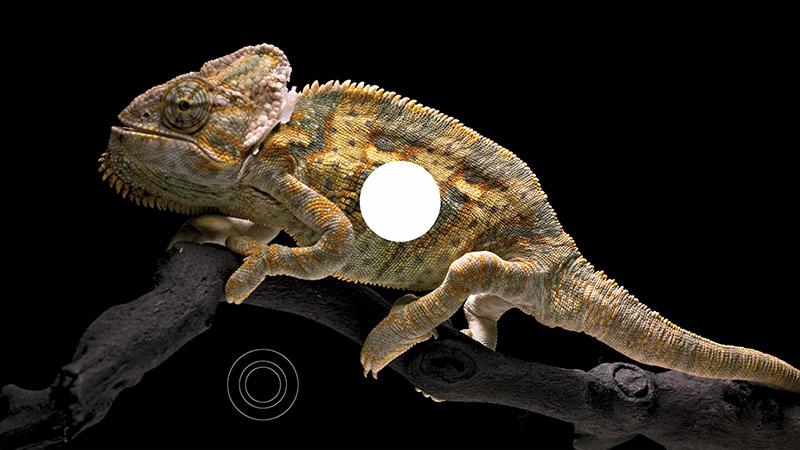
Result
∞:1
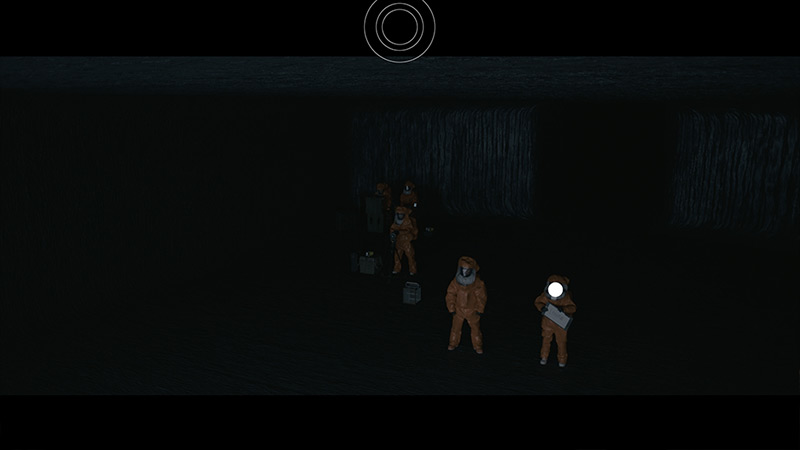
Result
∞:1

Result
∞:1
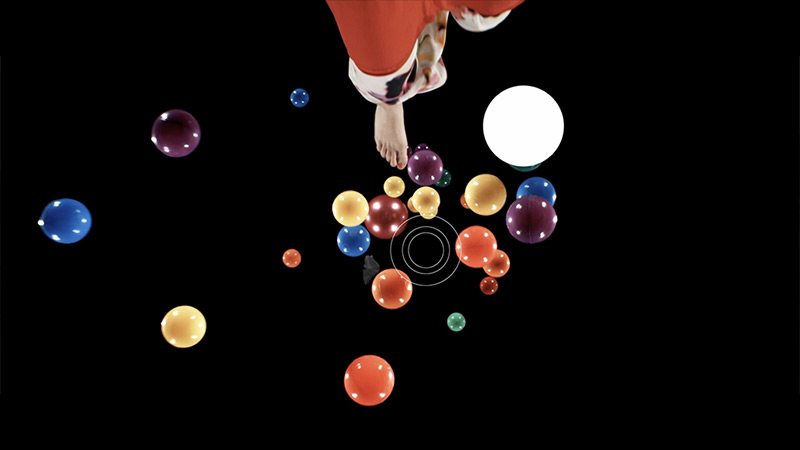
Result
∞:1

Result
114,000:1

Result
17,300:1

Result
16,200:1

Result
9,900:1

Result
4,850:1
Halo effect and black detail visibility:

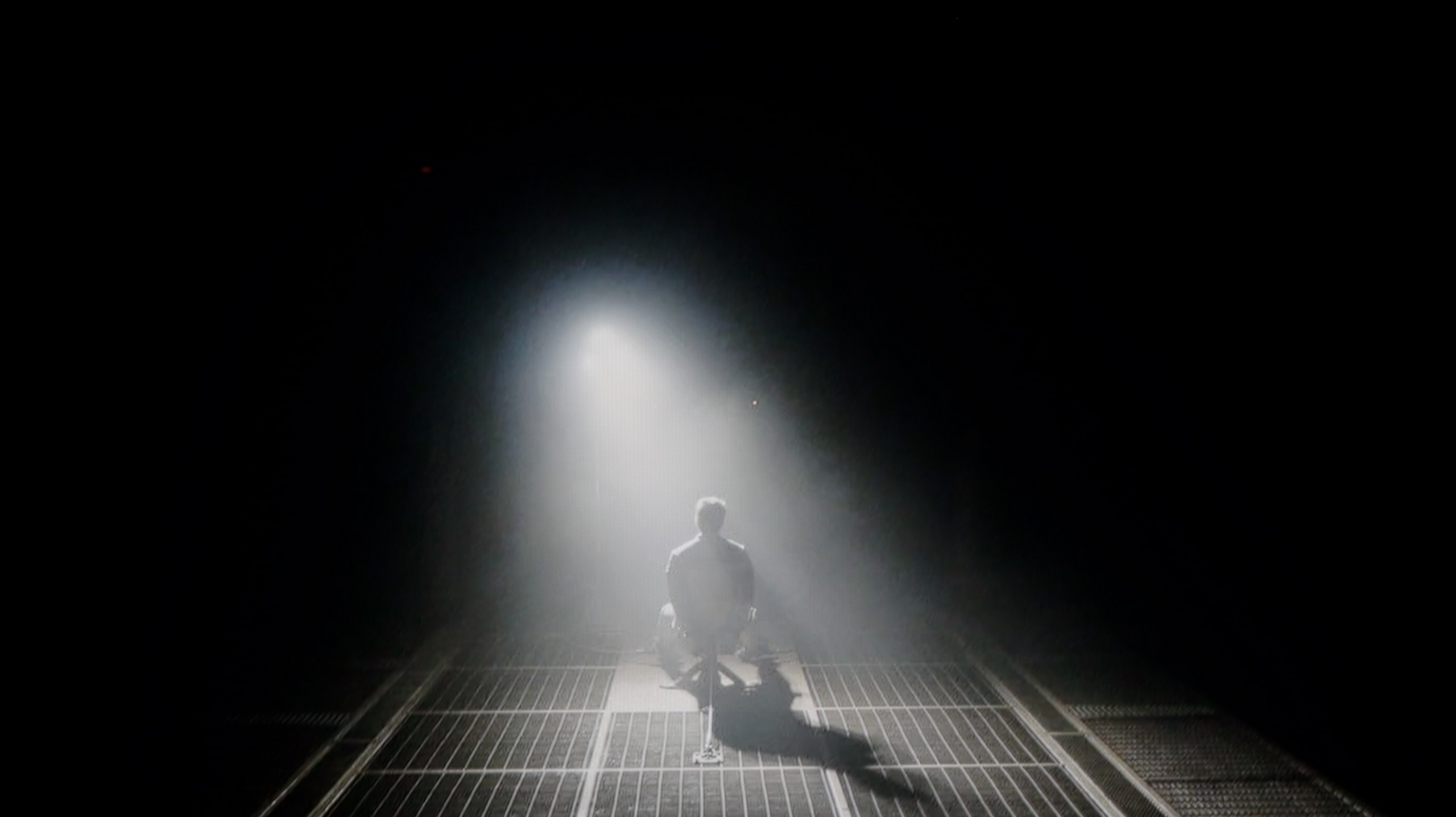
Samsung S90D, thanks to the OLED matrix used, offers infinite contrast, which is one of its greatest advantages. OLED matrices are characterised by the fact that each pixel emits its own light, allowing for deep blacks and excellent detail reproduction in dark scenes. Unlike traditional LCD matrices with backlighting, where black often takes on a grey hue due to uneven backlighting, OLED guarantees that switched-off pixels remain completely black. This allows for achieving a very high level of contrast, making the images more dynamic and realistic. In the scene from "Oblivion," the Samsung S90D brilliantly showcases the high light effect of the lantern, highlighting the intensity and details in the bright parts of the image. Conversely, in the film "Sicario 2," you can clearly see the separation of the helicopter lights from the dark background. A surprising aspect of the S90D model is that Samsung, after years of disputes, decided to use organic matrices manufactured by LG, in versions with "DAE" at the end of the name. Is that a bad thing? No! In terms of contrast, both WOLED and QD-OLED matrices offer the same, which is perfect black.
The TCL C6K is based on a VA panel, more specifically an HVA manufactured by TCL CSOT, which in itself provides solid native contrast at a level of 6000–7000:1 without the use of local dimming. However, the real strength of this model lies in the Mini-LED backlighting that allows for the dimming of individual zones. In the tested 55-inch version, we counted around 180 of these zones, and with an increase in diagonal size, this number naturally grows. For a television in this price segment, the contrast is truly impressive. In simpler film scenes, such as segments from "Oblivion," it performs excellently, and shots completely bathed in black make a great impression. Of course, due to the nature of Mini-LED technology, it is not always possible to avoid issues – in more challenging frames with many bright details, halo effects may appear or some elements may be dimmed too much (regardless of local dimming settings). Nevertheless, contrast can be considered a strong point of the C6K.
HDR effect quality
6.9/10
4.9/10
Luminance measurements in HDR:

Result
960 nit

Result
990 nit
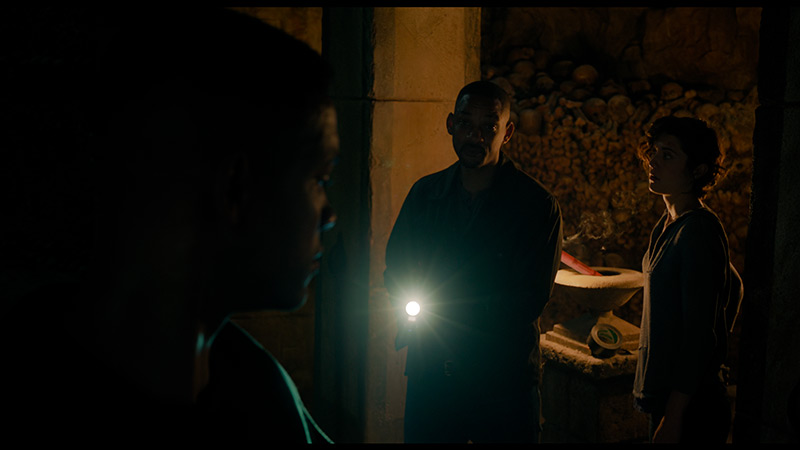
Result
1098 nit

Result
1042 nit

Result
490 nit

Result
612 nit

Result
202 nit

Result
424 nit

Result
144 nit

Result
587 nit
Scene from the movie “Pan” (about 2800 nits)


Scene from the movie “Billy Lynn” (about 1100 nits)


Static HDR10


Dynamic: HDR10+
Dynamic: Dolby Vision


HDR luminance chart:
TCL C6K
Luminancja HDR
Luminance of RGB colors
Samsung OLED S90D / S94D (WRGB OLED)
Luminancja HDR
Luminance of RGB colors
In the tested film scenes, the television Samsung S90D achieves impressive brightness results, exceeding the 1000 nits barrier in the first four shots, which can be considered an outstanding result. In the case of the last shot, where a full-screen flash of sunlight is visible, the brightness drops to around 500 nits, but still remains at a very good level. Additionally, the television impresses with a DCI-P3 colour gamut coverage measurement of 98%, ensuring an extraordinarily rich and realistic colour reproduction, further enhancing the picture quality. This result makes the Samsung S90D an ideal choice for those expecting high-quality images in a variety of lighting conditions.
TCL C6K is a moderately bright television that can showcase its full potential under the best cinematic conditions – the maximum brightness is around 600 nits. In scenes with large, intense light sources, the HDR effect can be truly satisfying, providing a sense of cinematic sparkle. However, it is important to remember that when managing backlight zones, there are occasions where some elements are dimmed, and at times become barely visible. It is clear that there is a lack of proper algorithm optimisation here, although looking at the technical parameters in this price range, the overall construction performs exceedingly well.
Factory color reproduction
7/10
5/10


Factory Mode
After calibration


Factory Mode
After calibration
The S90D television has been tested in Filmmaker mode, which offers good colour reproduction, although with some imperfections that may be noticeable to more discerning users. This mode may seem a bit too warm, and users who switched from Standard mode may experience a slight shock. It is worth noting that this situation is caused by poor settings, such as in the white balance, rather than the Filmmaker mode itself. In both SDR and HDR content, the device exhibits drops in blue colour, making colours warmer than they should be. In practice, this means that some shades, such as sky blue or skin tones, may appear less natural and more tinged with pink or yellow. The Colour Checker test confirms these deviations, showing shifts towards warmer tones. In SDR content, the gamma graph indicates slight fluctuations, resulting in a minimally darker image, especially in shadows. This can affect less defined details in darker scenes. Conversely, in 4K HDR materials, the EOTF curve is above the recommended line, leading to overly bright displays in certain parts of the image, which can cause clipping in the brightest areas. Overall, Samsung S90D presents a solid picture right out of the box, but for the best effects, especially with more demanding content, additional calibration is recommended.
In this year's TCL televisions, the Filmmaker mode has appeared, and it must be admitted that it is definitely the best choice straight out of the box. This is the mode we recommend for daily watching of films and series. Unfortunately, as is often the case, the best does not mean perfect. In the case of SDR content, the image was too warm, as the red was quite pronounced in the white balance. Conversely, with HDR content, we had the opposite impression – the image became cooler than it should have been due to an excess of blue. Additionally, the brightness characteristics sometimes led to overexposure. In practice, this resulted in quite noticeable errors in colour tests, which are difficult to accept in a mode advertised as "from the creators."
Color reproduction after calibration
8.7/10
7.5/10



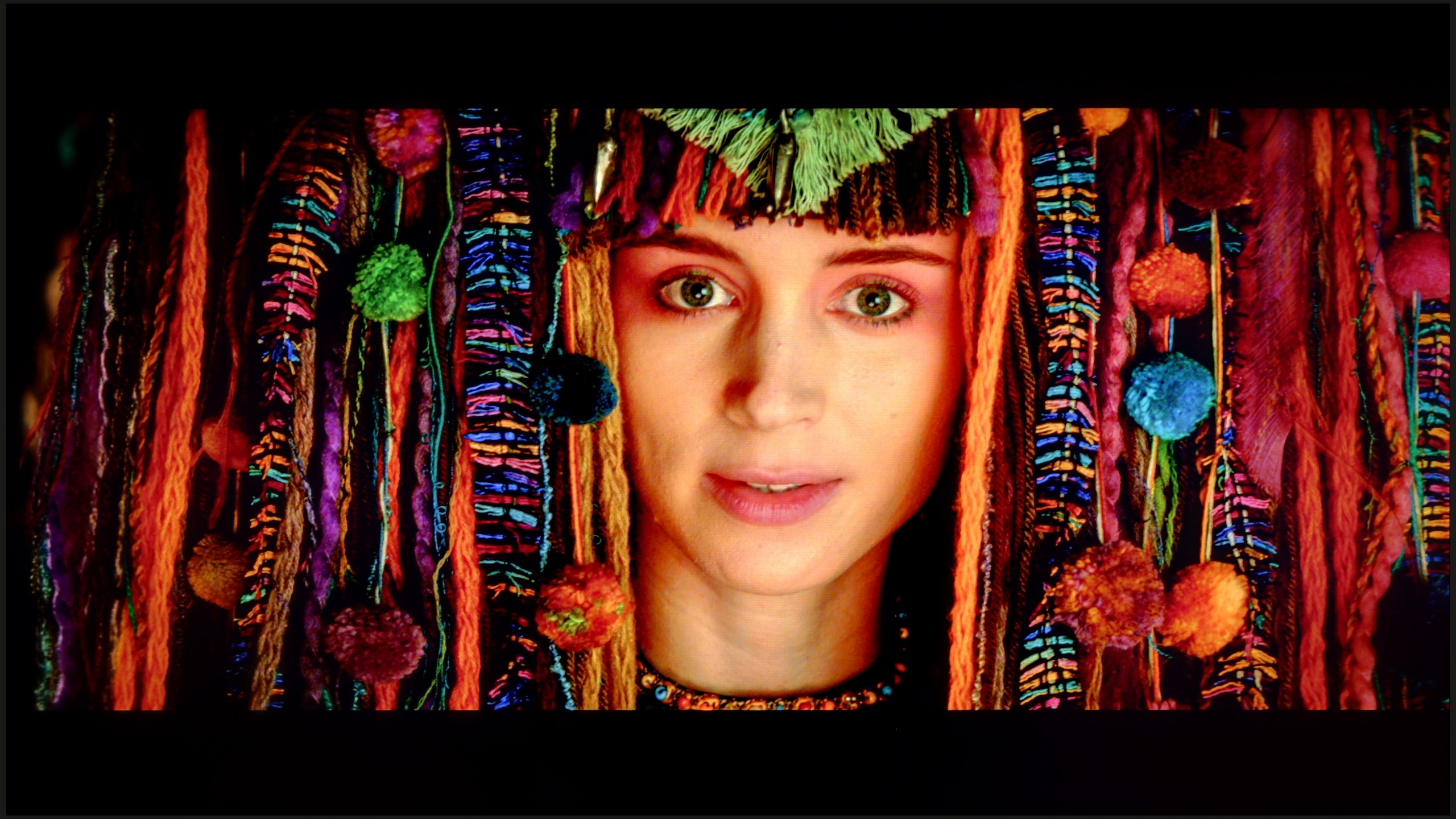
After calibration, the Samsung S90D television in movie mode looks even better than one might have expected. The white balance, for both HD and 4K HDR content, has been improved almost to perfection. Although minor flaws can still be noticed, they are minimal enough not to significantly affect the picture quality. The colours are more balanced, which translates to a natural reproduction of details, especially in scenes requiring a precise colour palette. It is worth noting that this model in this size is equipped with a WOLED panel, which has less coverage of the wide colour gamut and does not offer as rich colours as, for example, the 65-inch version, which is equipped with a QD-OLED panel.
Contrast has also seen significant improvement. The gamma graph post-calibration is much closer to the expected line, providing better balance between bright and dark areas of the image. The EOTF curve, which prior to calibration showed issues with overexposed scenes, now presents better results. This effect allows for greater detail retention in bright parts of the image, especially in HDR materials.
Thanks to the white balance adjustment, it was possible to significantly reduce the C6K's tendency to distort colours, which translated into a very good final result. After calibration, we will no longer observe the effect of excessive warmth in SDR scenes or overly cooling the image in HDR. However, it is worth taking a closer look at the brightness characteristics. In SDR content, it is difficult to have major objections – the image looks really good, especially in older films, television programmes, or materials from YouTube. It fares much worse in the case of HDR content. An analysis of the EOTF curve suggests that everything is fine, but in practice (EOTF in films), the limitations of the design become apparent. The television tends to over-brighten the smallest parts of the frame, and in other situations, it can dim an entire scene too much. The effect of calibration is therefore evident, and in terms of colour, the C6K has gained quite a lot, but certain limitations arising from local dimming and, in fact, from its management by the C6K simply cannot be overcome.
Smoothness of tonal transitions
7.6/10
9.5/10












The fluidity of tonal transitions on the Samsung S90D television is at a good level, although subtle imperfections are noticeable in places. In most scenes, tonal transitions are smooth and well-reproduced, providing a natural image viewing experience. In more demanding sequences, such as dark coloured skies, slight issues can occur; however, they do not significantly affect the overall visual experience. In the test scene with dominant red hues, one can notice slight cutoffs in the brighter areas, but they are subtle enough not to hinder viewing. Overall, the fluidity of tonal transitions on the Samsung S90D television scores well, ensuring a good reception of content.
The transitions between colours in the C6K are very smooth, and it is hard to fault any banding. The image looks natural, and any minor imperfections can only be noticed on bright test patterns – and that with really careful viewing. In everyday use, the effect is simply excellent, and one can confidently say that in this category, the C6K performs remarkably well.
Image scaling and smoothness of tonal transitions
7.9/10
5/10
Smooth transition function

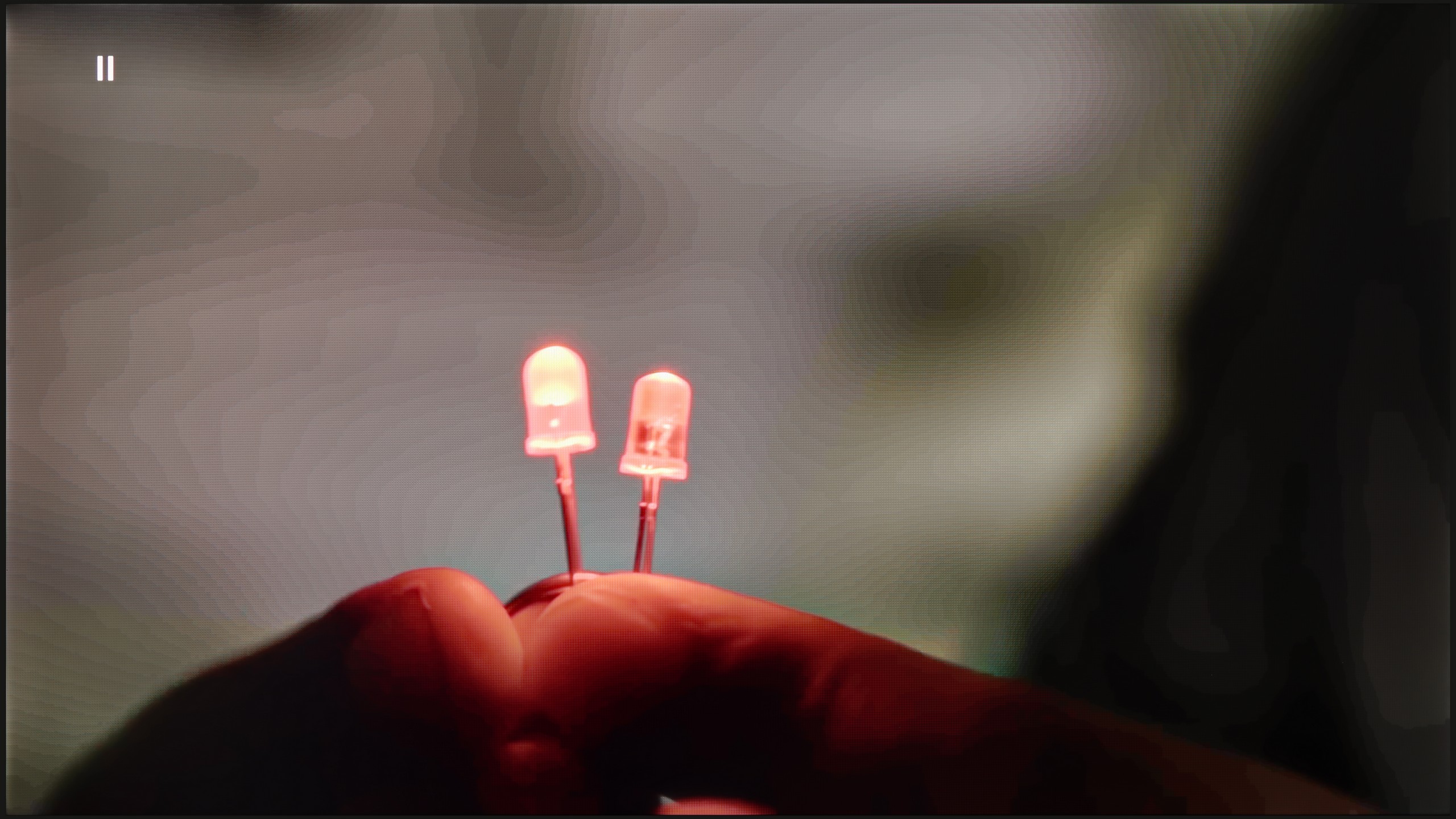
Image without overscan on the SD signal


Television S90D performs very well at smoothing tonal transitions. Thanks to the applied technology, the transitions between colours are more fluid and natural. There is also the option to use noise reduction, which further smooths tonal transitions, which can be useful in certain situations. However, it is worth remembering that enabling noise reduction can also lead to the smoothing of desirable film grain, which in turn could reduce the cinematic atmosphere of the image. For this reason, caution is advised when using this feature, as it is better to leave the natural grain that adds character and authenticity to the viewed content.
Samsung, as always, does not disappoint and excels in the area of scaling images from lower resolutions. The S90D Samsung television effectively processes lower resolutions, as can be seen in the visible image. The outline of the model is clear and accurate and, as a result, looks natural and detailed. Moreover, the branches of the trees are well-rendered, showing no significant jaggedness, which could diminish the image quality. Thanks to effective scaling, even materials in lower resolution present attractively on the screen, pleasing users who prefer various sources of content such as regular antenna/cable television.
TCL C6K performs quite well in terms of scaling. Lower quality materials look acceptable, and the absence of overscan issues means that the image is displayed in full, without cropping. However, one cannot expect miracles – very low-quality content will not gain a new life here, as the image processor has its limitations. On thin lines or details, there is a noticeable characteristic jerking, which reveals the lack of advanced image enhancement algorithms. It is also a pity that the C6K lacks the feature for smoothing tonal transitions – in older films or video materials, colour banding can be noticeable and can be distracting during longer viewing sessions.
Blur and motion smoothness
8.5/10
7.3/10

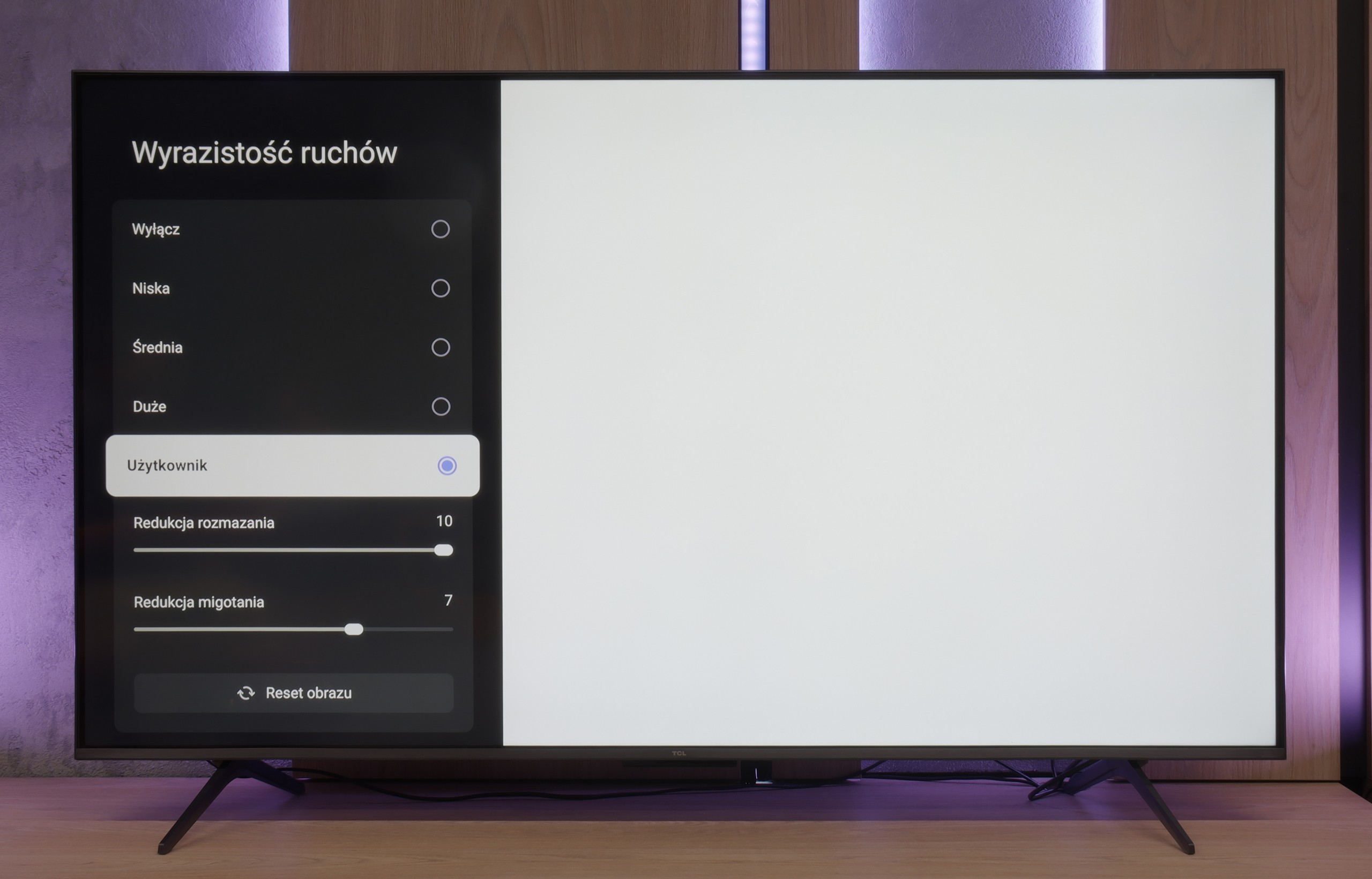
Blur (native resolution, maximum refresh rate):






Blur (BFI function enabled):
Image flickers in this mode



Samsung S90D TV is equipped with a 120 Hz panel, with the possibility of "overclocking" to 144 Hz with the appropriate PC configuration, providing exceptional motion fluidity. Samsung has been offering a variety of sharpness settings on a ten-point scale for years, allowing users to adjust the display to their preferences. In the UFO test, thanks to the use of an OLED panel, there's no sign of any smearing. The pixel response is instantaneous and perfectly captures dynamic movements. In this aspect, OLED technology is considered one of the best on the market. The picture is extremely sharp and detailed, even during fast actions, making the S90D TV an ideal choice for gamers and sports enthusiasts.
The TCL C6K utilises a 144 Hz panel, which is a significant advantage in this price range. This is an important step forward compared to the previous model, the C655 PRO, which only offered 60 Hz in 4K. The difference is especially noticeable when watching sports or gaming – the ball, players, or fast action in a game are shown more clearly and without losing details. Interestingly, the panel can also operate at 240 Hz, which the manufacturer does not mention in the official materials. We will return to this topic when discussing the PC gaming mode.
TCL has also added a feature for those watching films: "Motion Clarity", which allows users to adjust the image to their liking using two simple sliders. One can either keep the film frame visible or opt for a very smooth, almost theatrical effect. This way, everyone can find settings tailored to their taste.
Console compatibility and gaming features
9.5/10
9.8/10
- ALLM
- VRR
- VRR range48 - 144Hz48 - 240Hz
- Dolby Vision Game Mode
- Correct implementation of HGIG
- 1080p@120Hz
- 1440p@120Hz
- 4K@120Hz
- Game bar

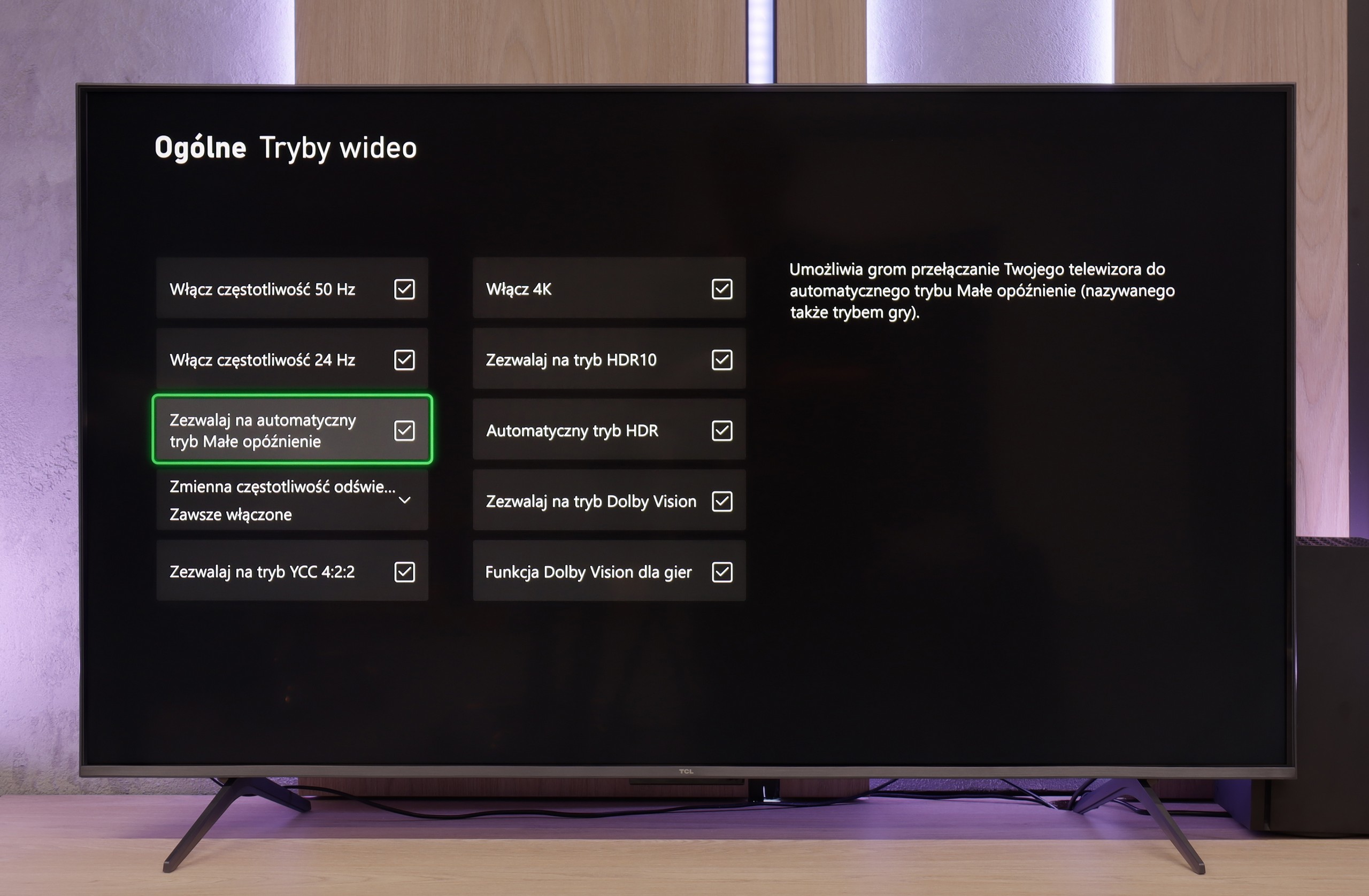

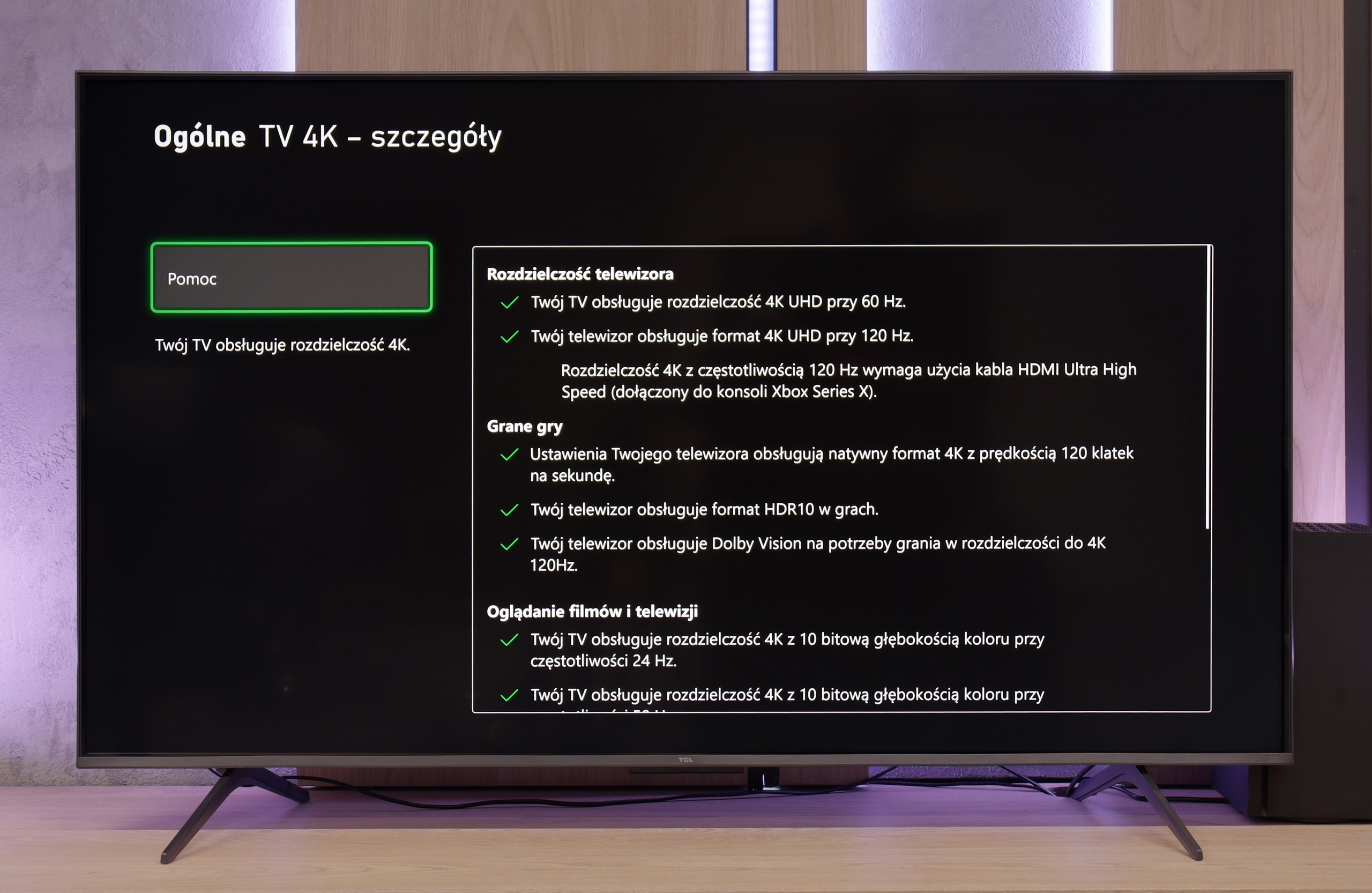

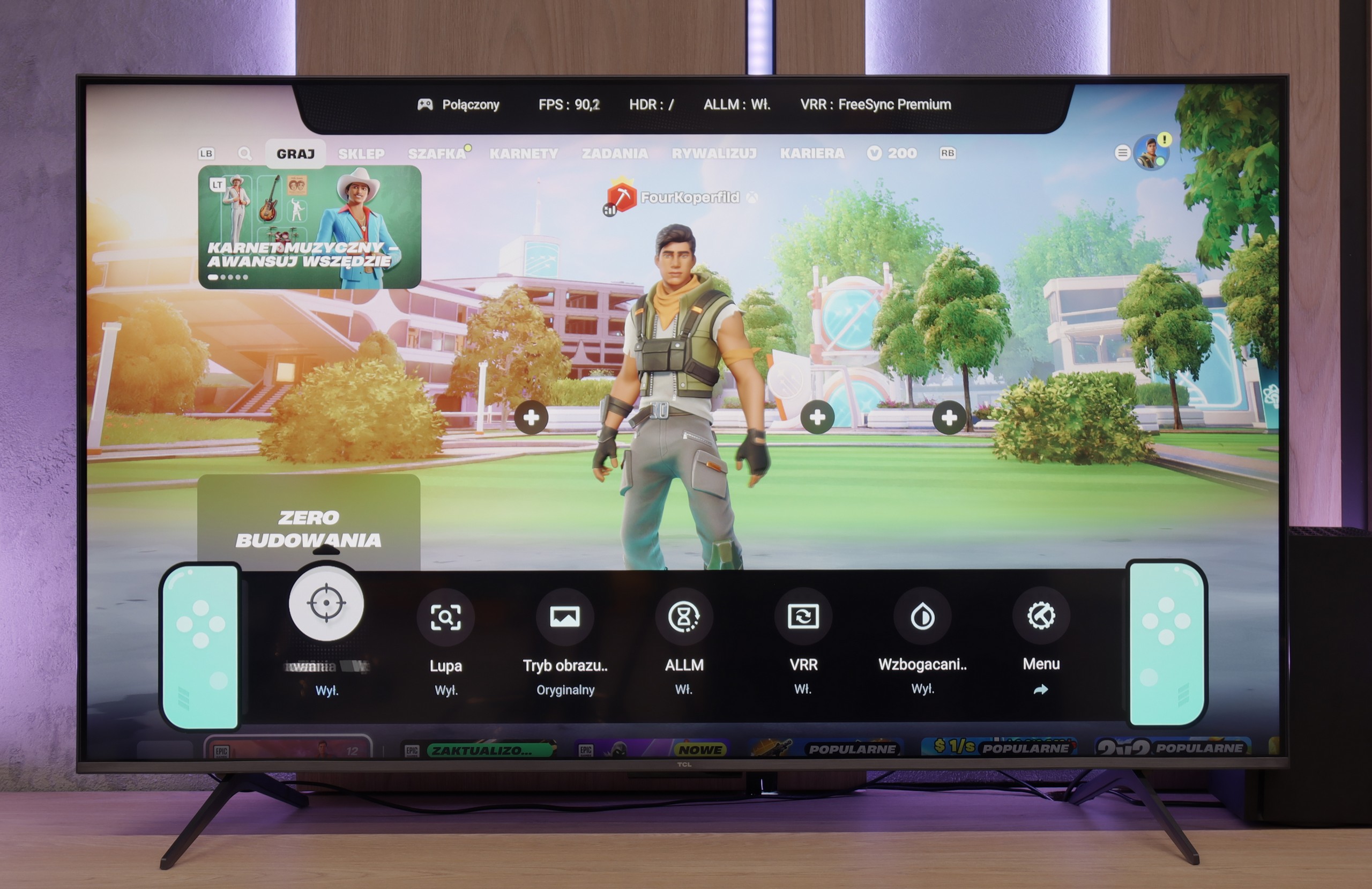

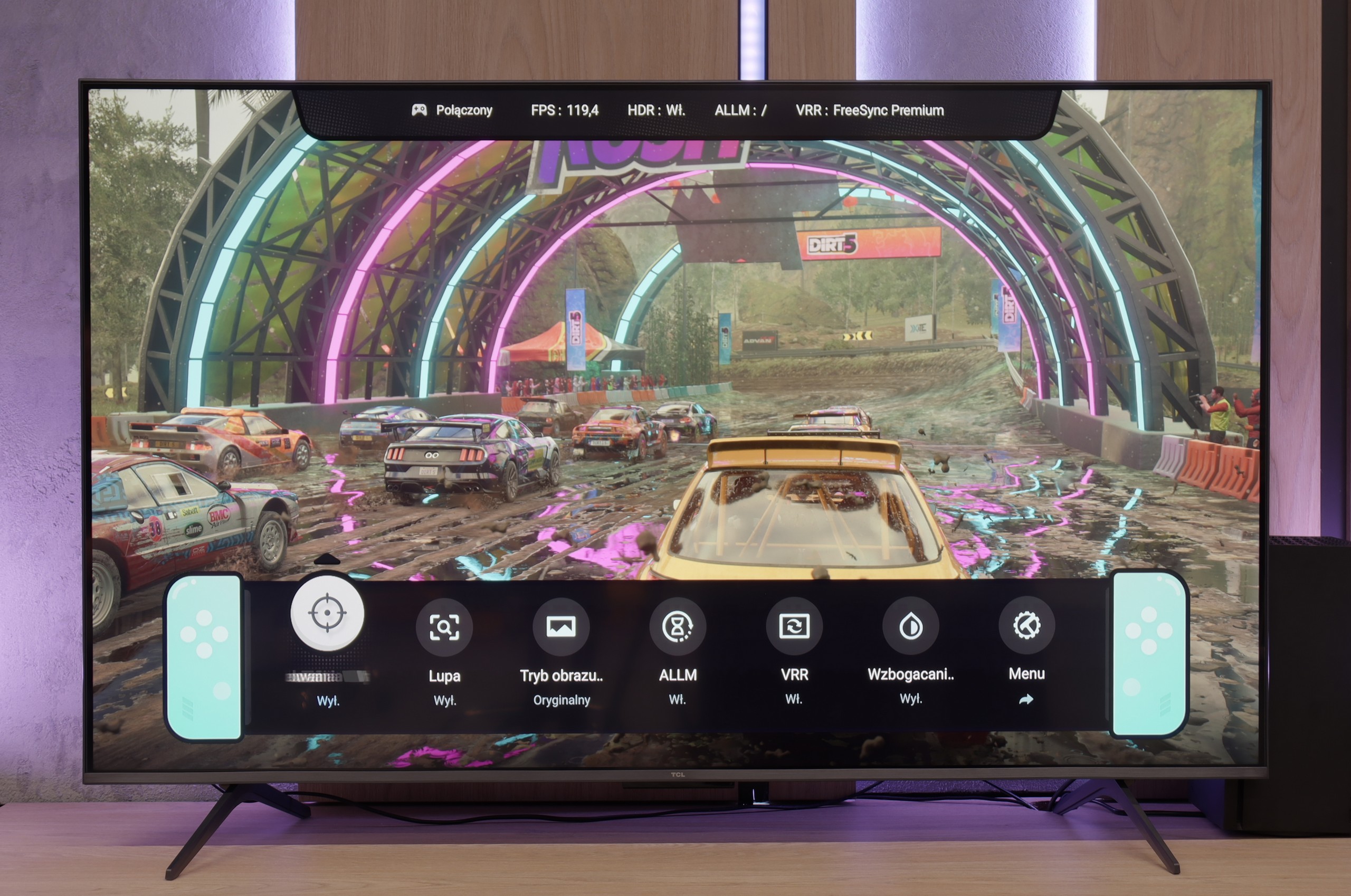
The Samsung S90D TV is perfectly adapted to the needs of gamers, offering four HDMI 2.1 ports that support key features such as Auto Low Latency Mode (ALLM), Variable Refresh Rate (VRR), and HDR Gaming Interest Group (HGIG). With these technologies, gamers can enjoy smoother and more responsive gameplay, significantly affecting comfort and performance during intense gaming sessions. An additional advantage of the television is the special Game Bar, which allows for easy management of game settings. This functionality enables quick adjustments to parameters such as changing the TV's screen aspect ratio, which can be useful in various games and types of gameplay. Users can easily customise their preferences, making the use of the TV during gaming even more convenient and enjoyable. As for PC users, the TV pleasantly surprises. When connected to a computer, the panel is capable of achieving a refresh rate of 144Hz, and users of Nvidia or AMD graphics cards can enjoy features such as G-Sync and FreeSync. It should be noted, however, that the TV does not support Dolby Vision, which may be a drawback - but it's worth bearing in mind that Dolby Vision is not as popular for games as it is for films. Nevertheless, the S90D TV still offers excellent features for gamers, making it a great choice for gaming enthusiasts who seek top-notch picture quality and modern technological solutions.
The TCL C6K is a television that can confidently be described as equipment designed with gamers in mind. Here we have 4K at 144 Hz, VRR support, automatic game mode (ALLM), and Dolby Vision Gaming. Additionally, there is a practical Game Bar, which is a panel with the most important settings easily accessible – useful when we want to quickly change something during gameplay (e.g. screen aspect ratio: Yes, it can be done!). The wide range of VRR is also noteworthy, reaching up to 240 Hz. However, this option is primarily for PC gamers who will drop the resolution below native 4K. At that point, the television can spread its wings and demonstrate extra fluidity, especially in fast-paced esports titles. In the case of consoles, we stick to the classic limit of 120 Hz, but the possibilities are still really broad. The only drawback might be slight ghosting, which can sometimes be seen in dynamic scenes. Apart from that, though, the C6K offers everything that gamers expect from a television.
Input lag
10/10
9.7/10
SDR
HDR
Dolby Vision
The Samsung S90D OLED features an exceptionally low input lag, regardless of resolution and frame rate, both in SDR and HDR modes. Results around 10 ms are truly impressive and significantly enhance the gaming experience. Such a low input lag ensures instant reactions to on-screen actions, which is crucial in fast-paced games where every millisecond counts. This allows users to enjoy fluidity and precision, making the Samsung S90D a superb choice for those prioritising gaming performance.
In terms of input lag, the TCL C6K performs exceptionally well. With 120 Hz content, the latency is around 10 ms, and at times even less. This is a level at which the response is practically instantaneous, and it is difficult to find any issues. With 60 Hz materials, the result is around 18 ms – still a very good outcome, entirely sufficient for comfortable gaming.
Compatibility with PC
8.6/10
8.6/10

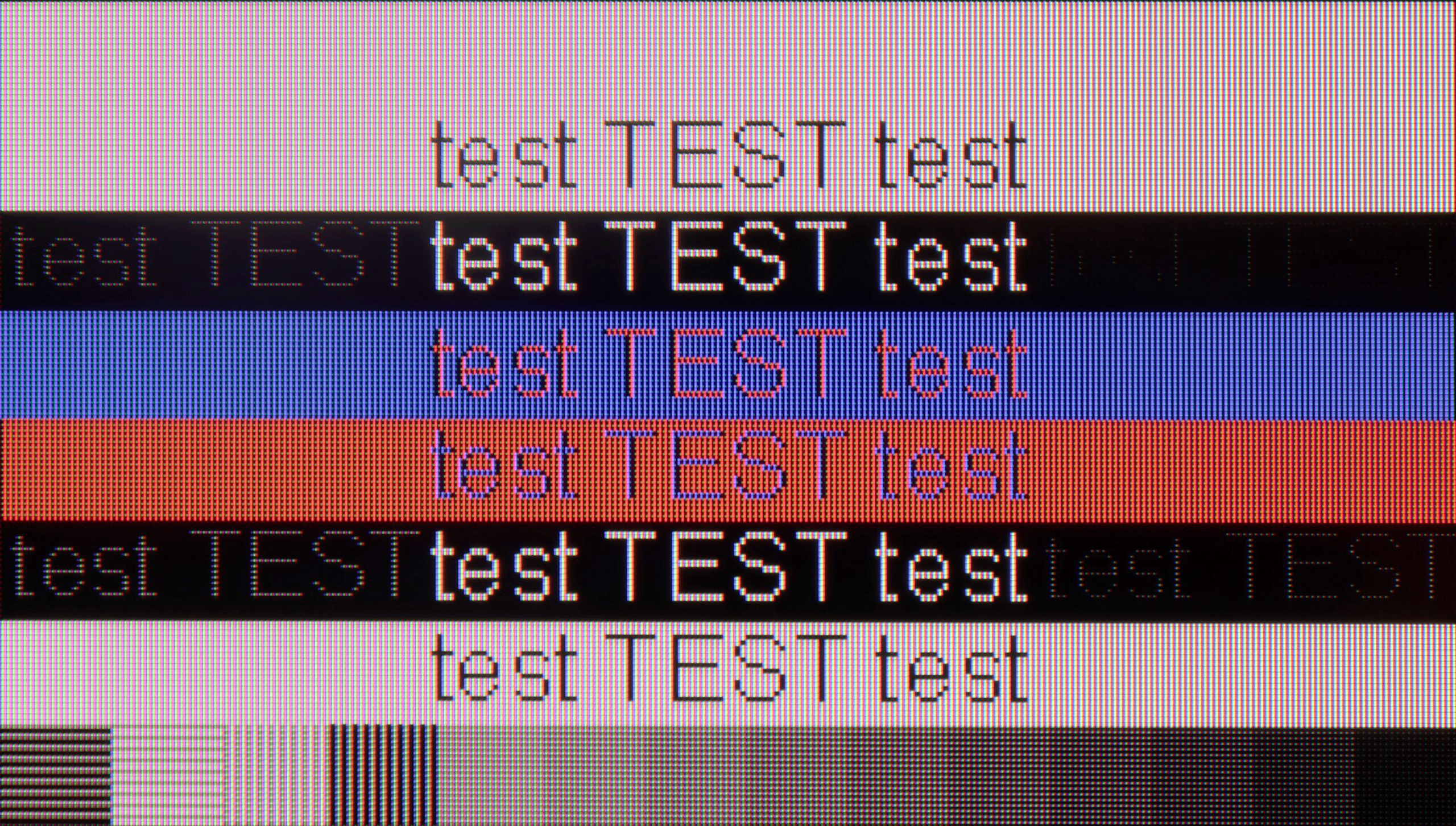
The Samsung S90D television works perfectly with a PC. The fonts are clearly visible, making it easier to read text and use applications. Additionally, it supports chroma 4:4:4 at 4K resolution and a refresh rate of 144 Hz, which ensures full colour reproduction and sharp image quality. It is worth mentioning that the input lag of only 5 ms is extremely advantageous, particularly for gamers and professionals working with graphics. With such low latency, using the television as a monitor becomes a pleasure, allowing for comfortable and responsive work. The Samsung S90D television is an excellent choice for users seeking performance and quality in everyday computer use.
After connecting to the TCL C6K computer, it performs wonderfully. At its native resolution, we have 4K at 144 Hz, and if we lower the resolution, it can even reach 240 Hz. Additionally, the television communicates well with Nvidia and AMD cards – it supports both G-Sync and FreeSync. It's also difficult to criticise for office work. Fonts are sharp and readable thanks to 4:4:4 chroma support, and any minor imperfections are so small that they simply go unnoticed during normal use.
Viewing angles
7.6/10
3/10
The viewing angles on the Samsung S90D television, thanks to OLED technology, are unparalleled. OLED offers excellent colour and contrast reproduction, even at wide viewing angles, ensuring that the image remains sharp and vibrant from almost any perspective. Users can enjoy a consistent visual experience, regardless of where they are watching the screen from. The only televisions that might perform better in this regard are models equipped with MLA (Micro Lens Array) or QD-OLED technology. These innovative solutions further enhance image quality from various angles, but under standard conditions, OLED remains the leader in terms of viewing angles, providing users with exceptional visual experiences.
In the TCL C6K, the viewing angles are typical for a VA panel. Sitting directly in front, the picture looks very good, but any shift to the side results in a noticeable drop in colour saturation and brightness. The difference is particularly evident in colourful scenes – the hues become washed out, and the contrast loses its depth. Compared to IPS panels, this is a clearly weaker performance, although the trade-off is better black levels and higher native contrast – “you win some, you lose some.”
TV efficiency during daytime
6/10
6.4/10

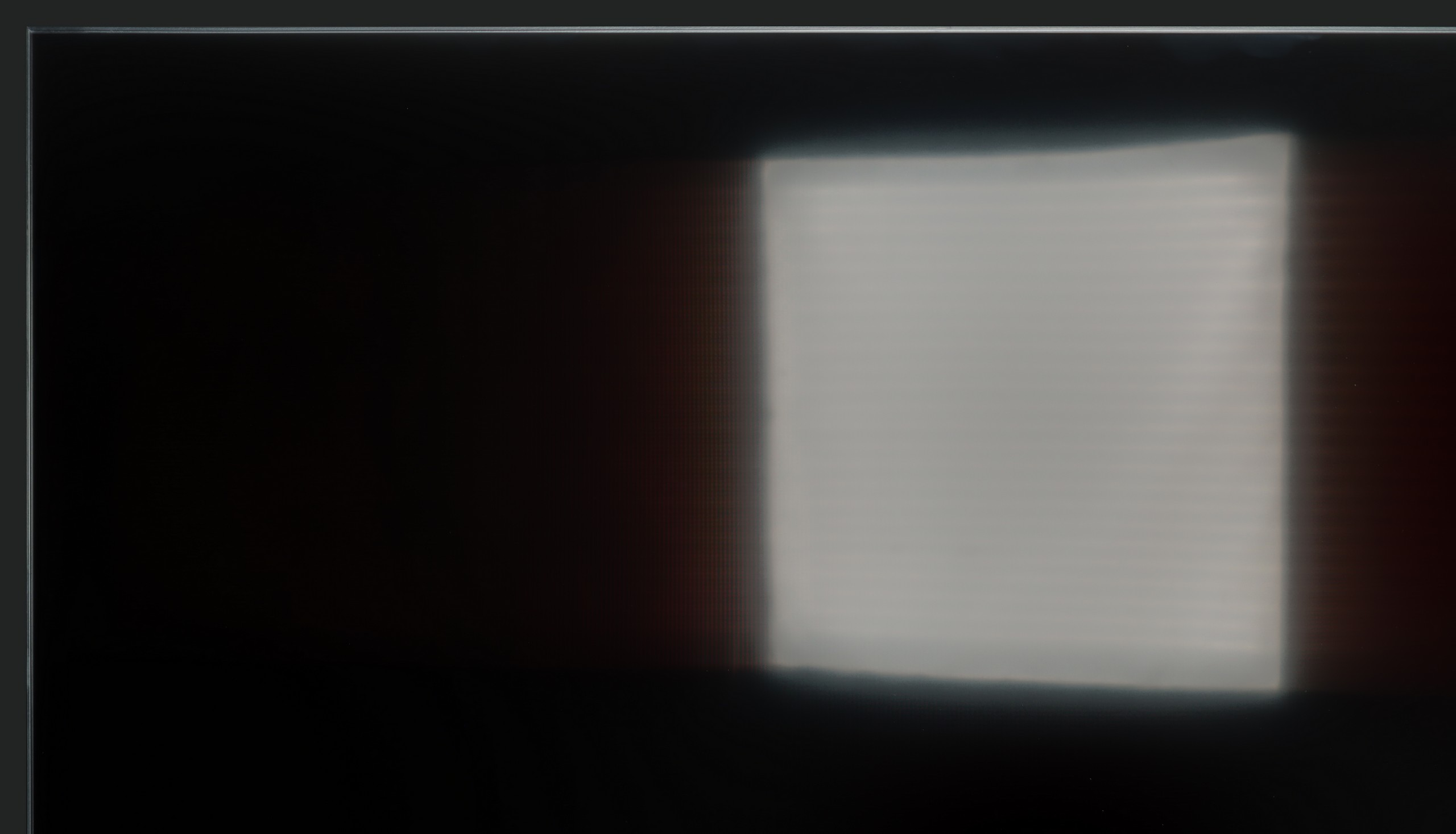


Matrix brightness
Average luminance SDR
TCL C6K: 532 cd/m2
Samsung OLED S90D / S94D (WRGB OLED): 396 cd/m2
When watching during the day, the Samsung S90D performs very well, achieving an average brightness level of around 400 nits, which is a very good result for OLED technology. Despite the glossy display, the suppression of reflections is at a decent level, allowing for comfortable viewing even in bright rooms. The only noticeable drawback of this technology, rather than the television itself, is the brightness at 100% white screen fill. In such conditions, OLED may struggle to achieve extremely high brightness. Situations like this can be seen when we want to watch winter sports, such as ski jumping.
TCL C6K performs quite well in bright lighting conditions. The panel offers decent brightness – in SDR content, it reaches around 550 nits, which allows for comfortable television viewing in a moderately lit living room, and even on days with strong light coming through the windows. This means that daytime viewing does not require complete darkening of the room. It's also worth noting that the screen coating does quite a good job of reducing reflections, so the television does not turn into a "mirror" even with strong lighting. However, this is not on the level of top models with more advanced anti-reflective coatings – in very challenging conditions, such as with large glazing, reflections will be noticeable.
Details about the matrix
Subpixel Structure:

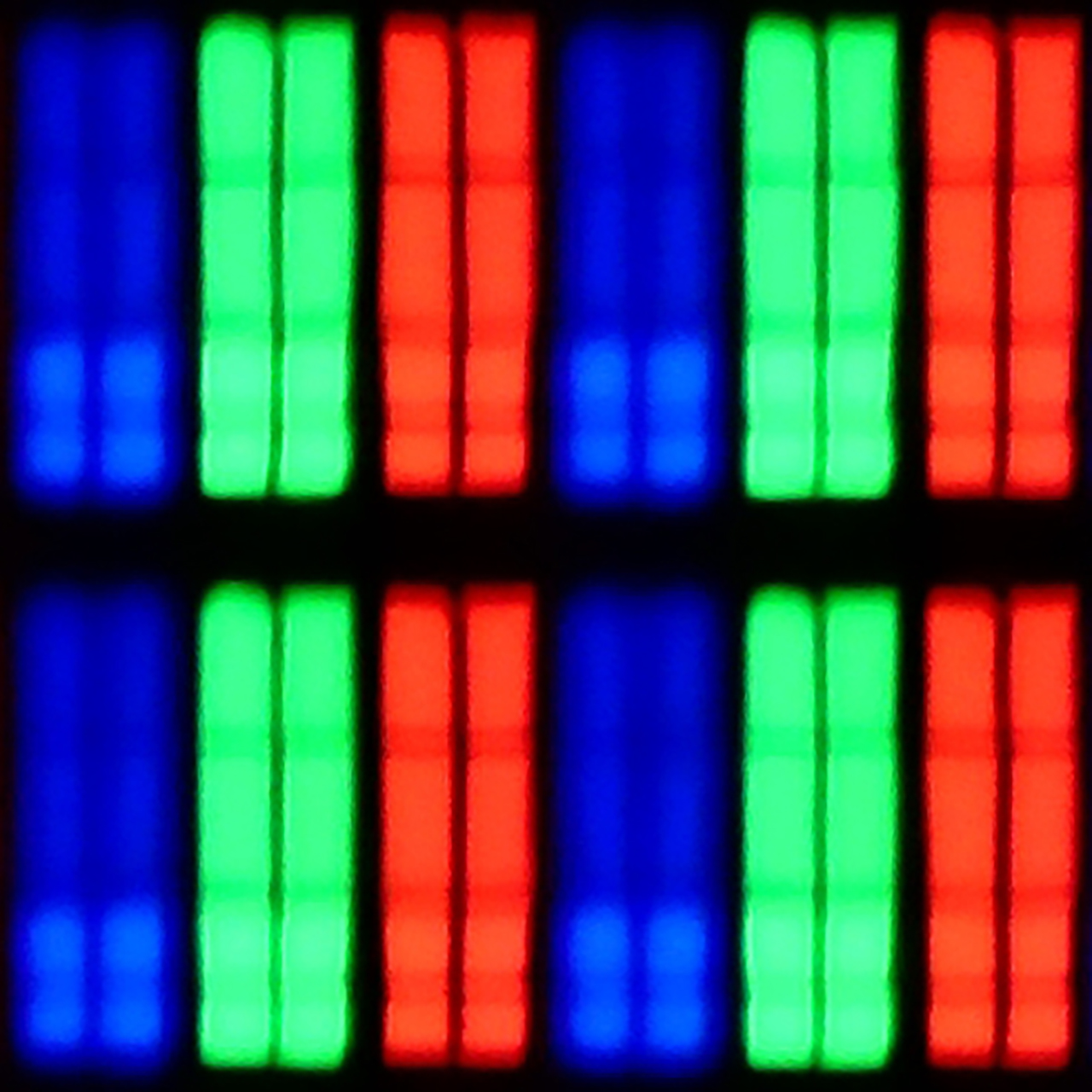
Panel uniformity:

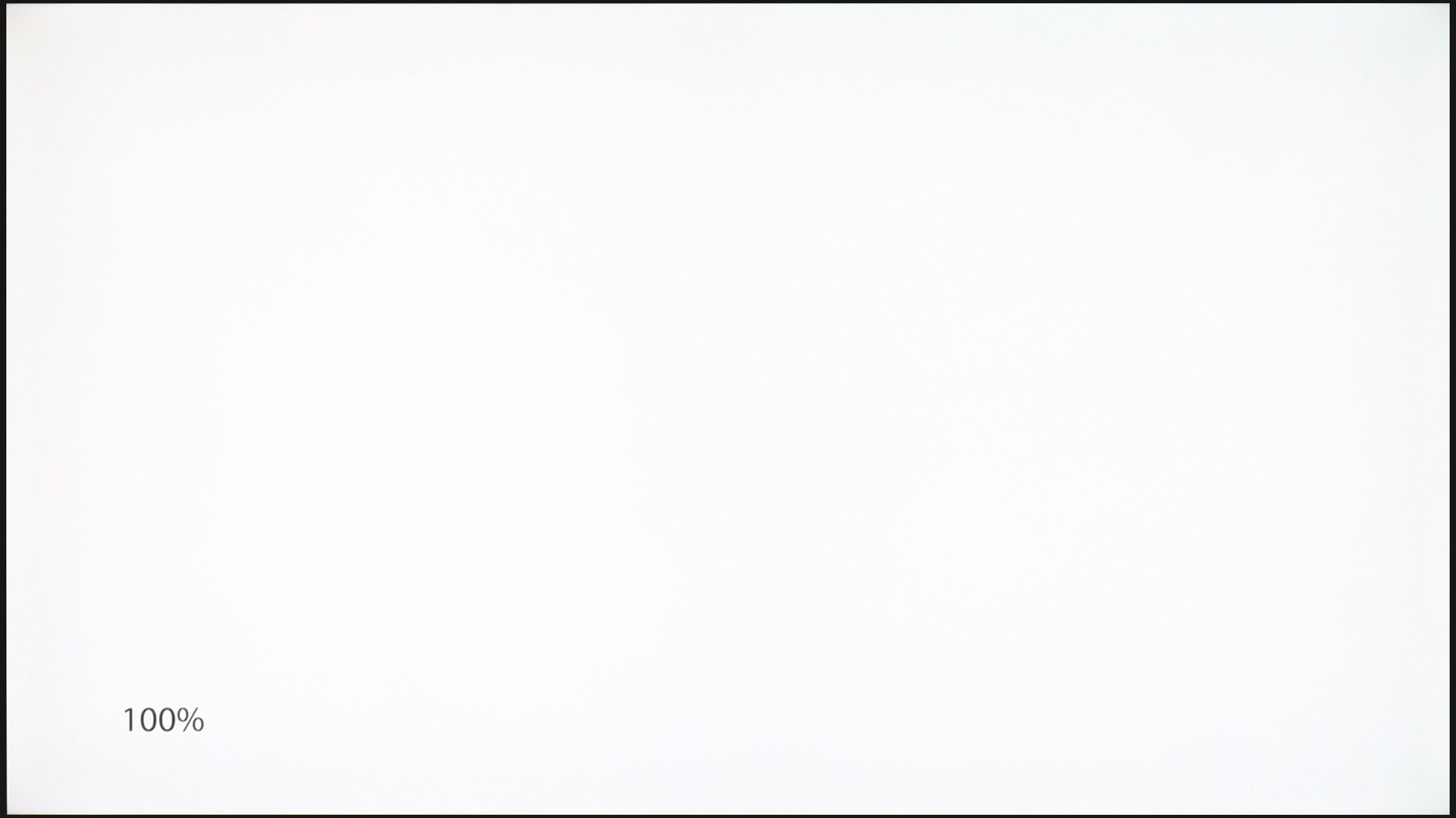
Samsung OLED S90D / S94D (WRGB OLED)
TCL C6K
TV features
7.4/10
7/10
- HDMI inputs0 x HDMI 2.0, 4 x HDMI 2.1 48Gbps2 x HDMI 2.0, 2 x HDMI 2.1 48Gbps
- OutputsToslink (Optical audio), eARC (HDMI), ARC (HDMI)Toslink (Optical audio), eARC (HDMI), ARC (HDMI)
- Network InterfacesWi-Fi 2.4GHz, Wi-Fi 5GHz, Ethernet (LAN) 100MbpsWi-Fi 2.4GHz, Wi-Fi 5GHz, Ethernet (LAN) 100Mbps
- TV receptionDVB-T, DVB-T2, DVB-S, DVB-S2, DVB-CDVB-T, DVB-T2, DVB-S, DVB-S2, DVB-C
Classic features:
- Recording to USB (terrestrial TV)
- Recording programming
- Picture in Picture (PiP)
- RF remote control (no need to aim at the screen)
- Backlit remote control
- Teletext
- Audio only mode
- Possibility to connect Bluetooth headphones to the TV
- Possibility to simultaneously use Bluetooth headphones and the TV speaker
Smart features:
- AirPlay
- Screen mirroring (Windows Miracast)
- Wyszukiwanie głosowe
- Voice search in native language
- Ability to connect a keyboard and mouse


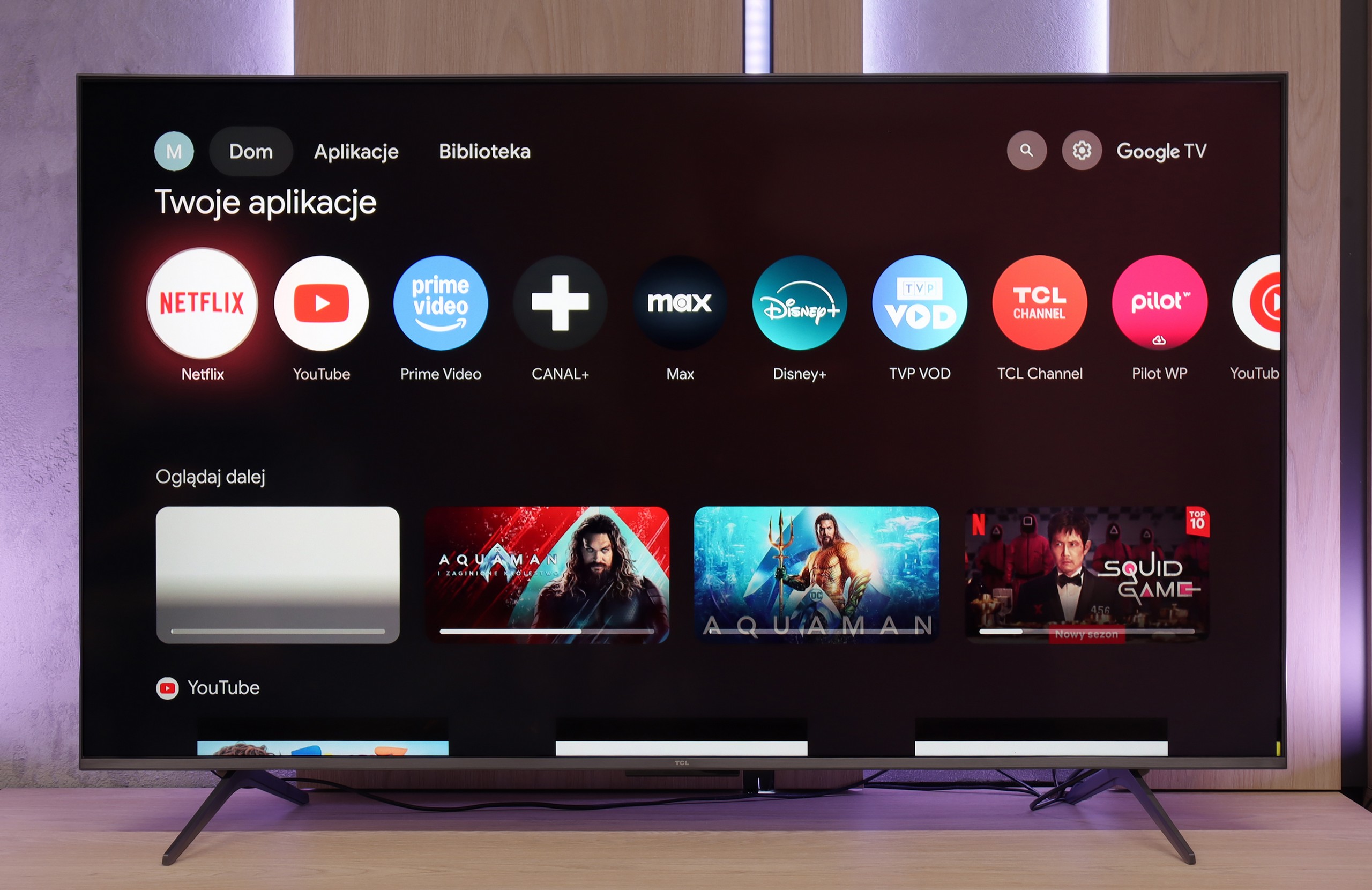
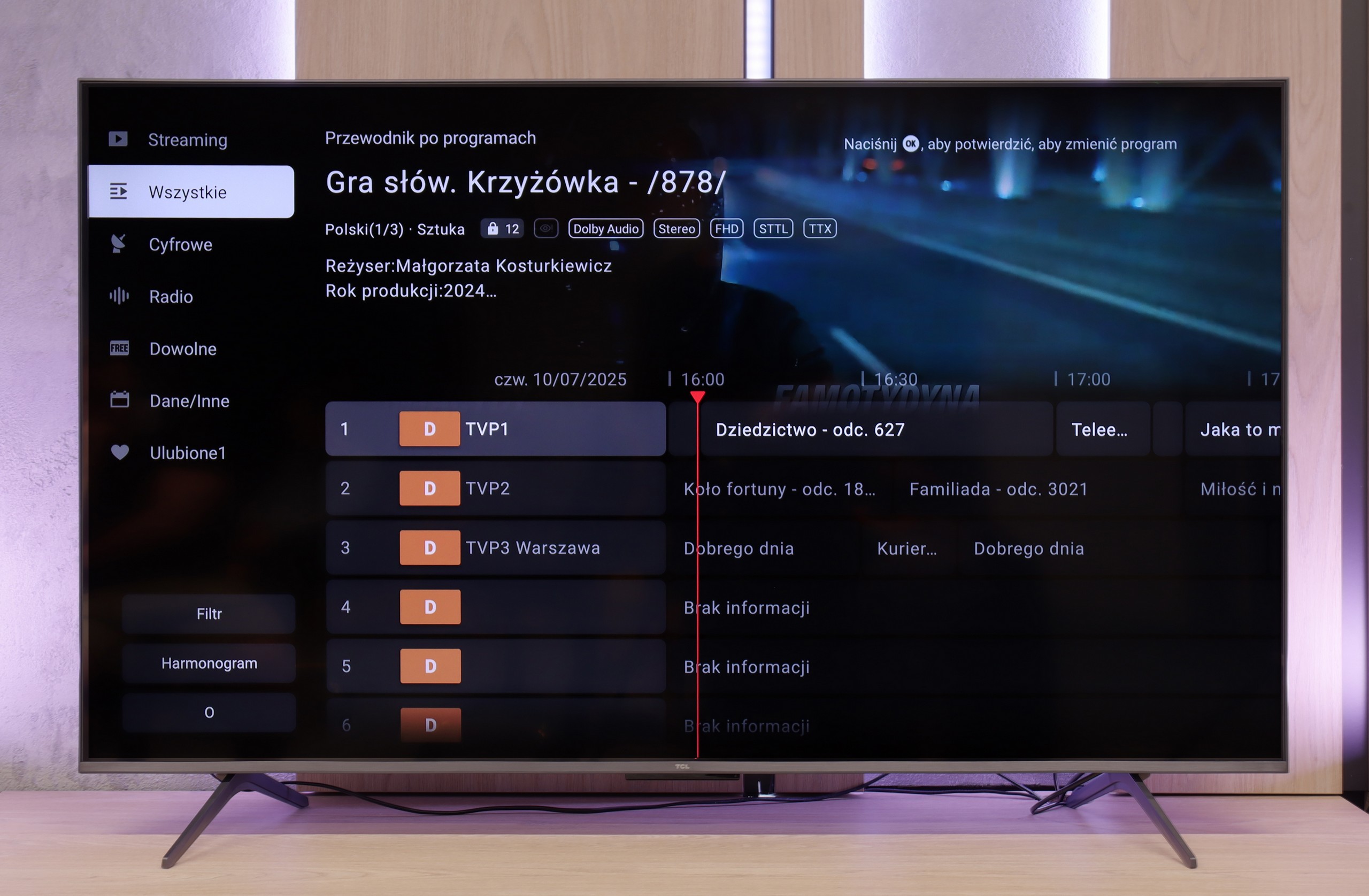
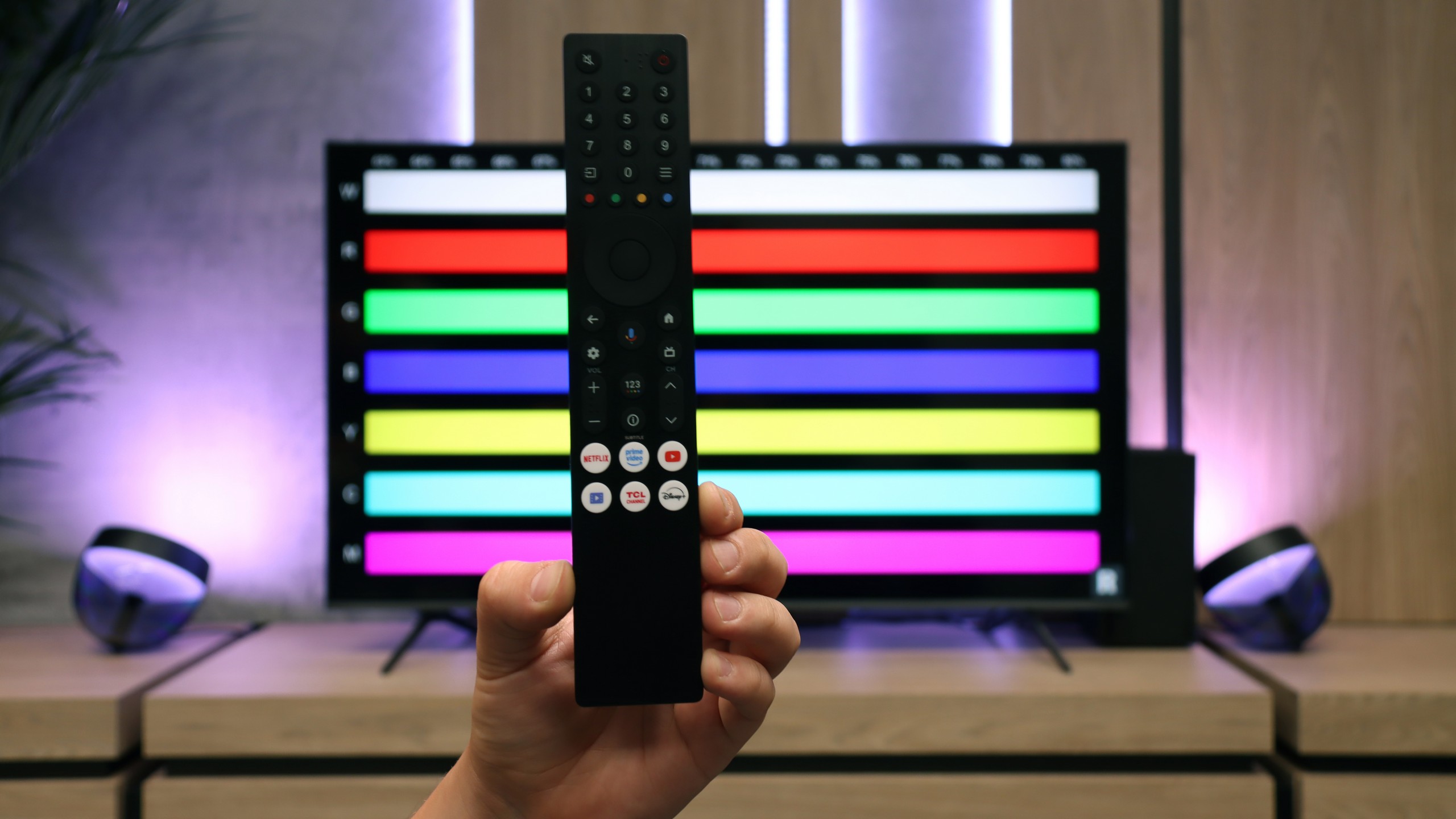
The Samsung S90 television offers a range of features that significantly enhance user comfort and make it an ideal device for home entertainment. The Tizen system, upon which this model is based, is a modern and advanced platform that provides users with an intuitive and smooth experience. Thanks to the user-friendly interface, navigating through applications and settings is quick and intuitive, making it easier for even those less familiar with technology to use the television. Tizen supports a rich set of applications, including all popular streaming services such as Netflix, YouTube, and Amazon Prime Video. A novelty for 2024 is also the availability of voice search in Polish. It's worth noting the eco-friendly solar remote, which is not only environmentally friendly but also practical for everyday use. For example, the remote can control multiple devices connected to the television, which means we don't have to use multiple remotes. Additionally, the television supports AirPlay, allowing easy content sharing from Apple devices such as iPhone or iPad. The S90D Samsung also allows for the connection of various Bluetooth devices, such as mice, keyboards, or headphones, which increases its versatility and enables the personalization of user experiences. Users can easily adjust their settings to make the most of the television's capabilities. The only downside that can be pointed out is the lack of USB recording support. For some users, this may be a limitation, especially when wanting to archive favourite programmes or films. Despite this, the Samsung S90D offers many advanced features and technologies that make it an excellent choice for anyone looking for high-quality entertainment in their home.
Multimedia Features: Google TV
The strongest aspect of the TCL C6K is undoubtedly the Google TV system. It gives the television character and provides an edge over many competitors. We have a full package of services here – from support for popular streaming apps, to screen mirroring support, and even AirPlay, allowing iPhone users to feel right at home. Additionally, it features Google Assistant (recently with the Gemini AI version), which not only answers questions but also efficiently executes simple commands, such as changing channels or searching for content on VOD services. The system operates quite responsively, although one must mention a certain drawback – the awkward translations in the Polish menu can elicit a smile but sometimes require a moment of reflection to decipher what is actually meant.
Classic Features
When it comes to classic television functions, the TCL C6K performs rather average. There is no USB recording or PiP mode, which may be disappointing for some. However, the manufacturer has not forgotten the basics – teletext television and a clear EPG are available, which still matter to some users. In everyday use, the Bluetooth support for external audio devices is also handy – a simple way to connect a speaker or headphones, which can be a practical solution for seniors. Besides that, it is hard to find elements here that would distinguish the C6K from its competitors – it is simply a solid, but standard package of basic functions.
Playing files from USB
9.1/10
8.9/10
Supported photo formats:
Maximum photo resolution:

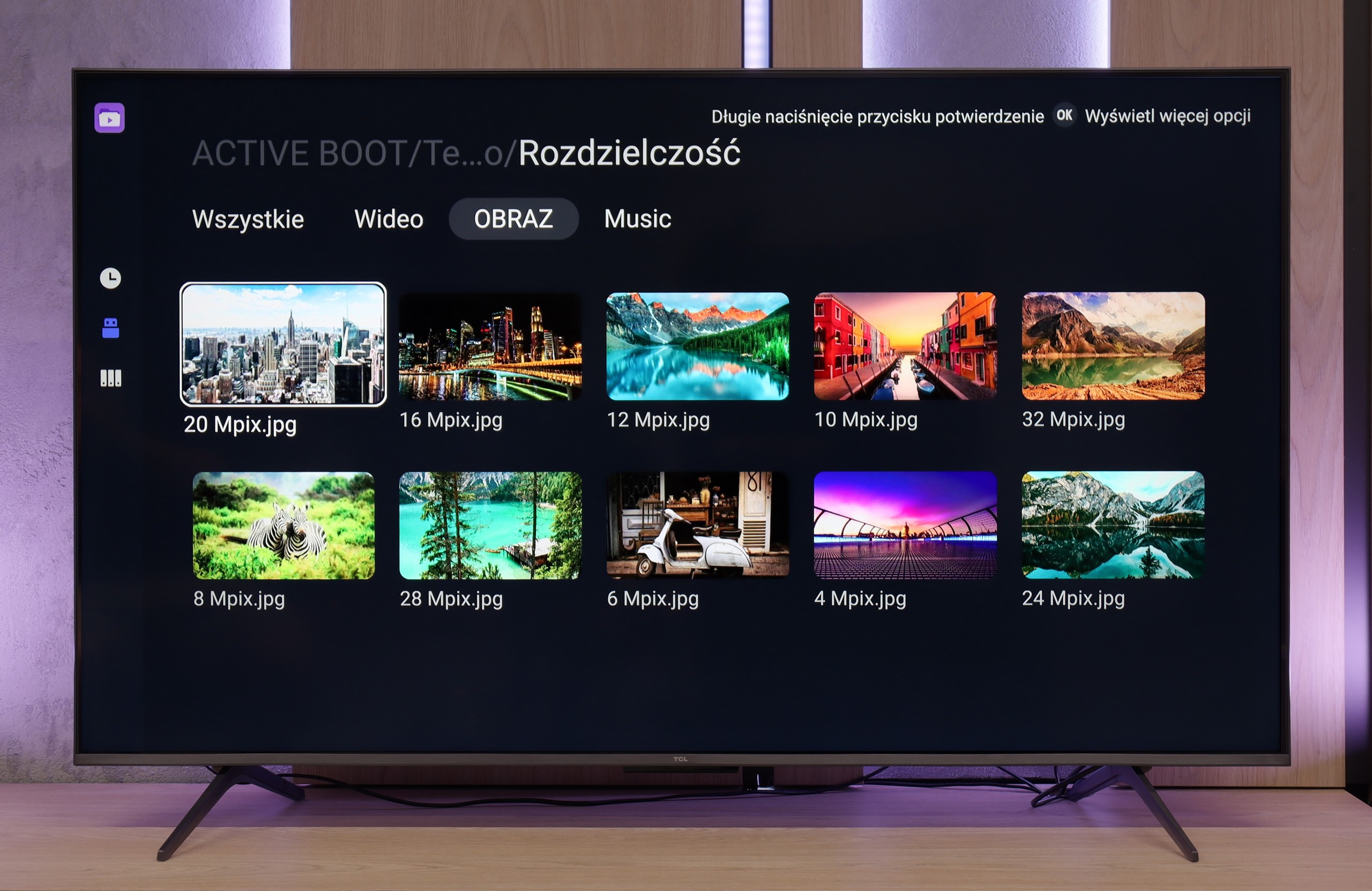
Samsung S90D is equipped with a built-in player that supports most popular video formats, allowing for convenient playback of films from various sources. The player also supports subtitles in Polish and enables users to customise the font colour, increasing comfort while watching content with subtitles. In terms of photo formats, the television handles many of them well, however, one of the few drawbacks is the inability to play the popular PNG format. Nevertheless, the overall file playback capabilities of the S90D are outstanding.
The built-in media player in the TCL C6K performs really well - almost all popular file formats work without significant issues. There are indeed minor exceptions, particularly with less common codecs or unconventional video file configurations, but in everyday use, this is rarely noticeable. The biggest advantage, however, is that the television runs on Google TV, which provides complete freedom in choosing additional software. If someone encounters a file that the standard player cannot handle, it's enough to install an alternative - such as VLC - and the problem disappears.
Apps
8.7/10
9.6/10














































Sound
7.4/10
6.5/10
- Subjective sound quality:7.4/106.5/10
- Dolby Digital Plus 7.1:
- Dolby True HD 7.1:
- Dolby Atmos in Dolby Digital Plus (JOC):
- Dolby Atmos in Dolby True HD:
- DTS:X in DTS-HD MA:
- DTS-HD Master Audio:
The Samsung S90D television is equipped with a 2.1 audio system with a total power of 40 W, providing clear and dynamic sound. Thanks to the subwoofer located at the bottom of the casing, the bass is deep and palpable, while the mid and high tones remain well balanced. It is worth noting that the twin model S94D offers an even more advanced 2.1.2 speaker system with a power of 60 W. If the silver colour of the S94D casing is not a hindrance, and the price difference between these models is minor, it is worth considering the version with the number "4" at the end. Although the television does not support the DTS format, it offers other audio technologies such as Dolby Atmos and Dolby Digital Plus. However, to fully enjoy spatial sound, it is worth considering connecting an external audio system.
In terms of audio, the TCL C6K performs quite well. The manufacturer has been boasting about its collaboration with the Onkyo brand for several years, and it indeed translates into sound quality. The sound is pleasant, with clear mid-tones and a fairly crisp top end, and overall it feels well-balanced. Of course, it can't replace a full-fledged soundbar, especially in terms of bass depth, but as far as built-in speakers in a television in this price segment go – it's really very good.


